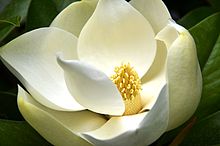Magnolia grandiflora
| Southern magnolia | |
|---|---|
 |
|
| Magnolia grandiflora (southern magnolia) | |
| Scientific classification | |
| Kingdom: | Plantae |
| (unranked): | Angiosperms |
| (unranked): | Magnoliids |
| Order: | Magnoliales |
| Family: | Magnoliaceae |
| Genus: | Magnolia |
| Subgenus: | M. subg. Magnolia |
| Section: | M. sect. Magnolia |
| Species: | M. grandiflora |
| Binomial name | |
|
Magnolia grandiflora L. |
|
 |
|
Magnolia grandiflora, commonly known as the southern magnolia or bull bay, is a tree of the family Magnoliaceae native to the southeastern United States, from coastal North Carolina to central Florida, and west to East Texas and Oklahoma. Reaching 27.5 m (90 ft) in height, it is a large, striking evergreen tree with large, dark green leaves up to 20 cm (7.9 in) long and 12 cm (4.7 in) wide, and large, white, fragrant flowers up to 30 cm (12 in) in diameter. Although endemic to the lowland subtropical forests on the Gulf and south Atlantic coastal plain, magnolia grandiflora is widely cultivated in warmer areas around the world. The timber is hard and heavy, and has been used commercially to make furniture, pallets, and veneer.
Magnolia grandiflora is a medium to large evergreen tree which may grow 120 ft (37 m) tall. It typically has a single stem (or trunk) and a pyramidal shape.
The leaves are simple and broadly ovate, 12–20 cm (4.7–7.9 in) long and 6–12 cm (2.4–4.7 in) broad, with smooth margins. They are dark green, stiff and leathery, and often scurfy underneath with yellow-brown pubescence.
The large, showy, lemon citronella-scented flowers are white, up to 30 cm (12 in) across and fragrant, with six to 12 petals with a waxy texture, emerging from the tips of twigs on mature trees in late spring.
Flowering is followed by the rose-coloured fruit, ovoid polyfollicle, 7.5–10 cm (3.0–3.9 in) long, and 3–5 cm (1.2–2.0 in) wide.
Exceptionally large trees have been reported in the far southern United States. The national champion is a specimen in Smith County, Mississippi, that stands an incredible 37 m (121 ft). Another record includes a 35-m-high specimen from the Chickasawhay District, De Soto National Forest, in Mississippi, which measured 17.75 ft in circumference at breast height, from 1961, and a 30-m-tall tree from Baton Rouge, which reached 18 ft in circumference at breast height.
...
Wikipedia
